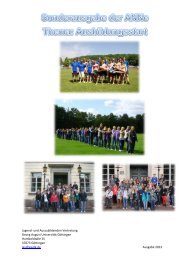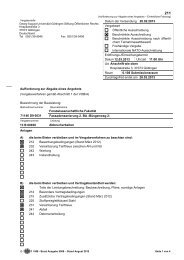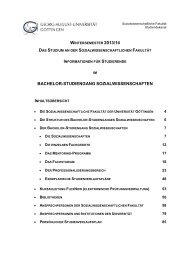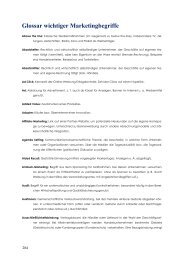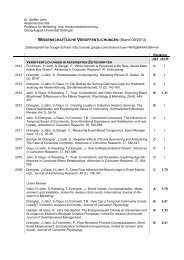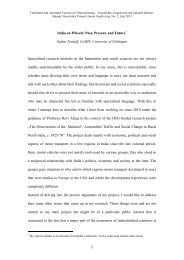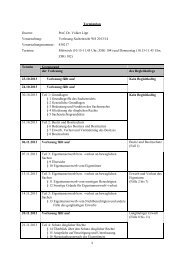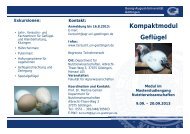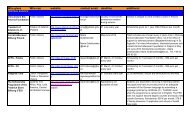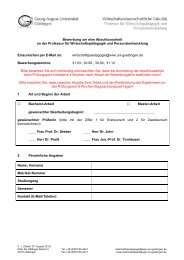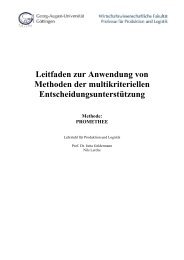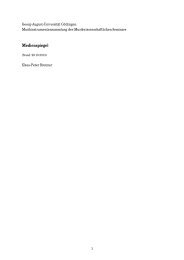CRC 990 - EFForTS - Georg-August-Universität Göttingen
CRC 990 - EFForTS - Georg-August-Universität Göttingen
CRC 990 - EFForTS - Georg-August-Universität Göttingen
Create successful ePaper yourself
Turn your PDF publications into a flip-book with our unique Google optimized e-Paper software.
<strong>CRC</strong> <strong>990</strong> Ecological and Socioeconomic Functions of Tropical Lowland Rainforest Transformation Systems (Sumatra, Indonesia) Issue 1 / <strong>August</strong> 2013<br />
page 24 von 32<br />
VI. International Conferences /<br />
Presentations<br />
The Association for Tropical Biology and Conservation<br />
(ATBC) Asia-Pacific Chapter annual meeting<br />
2013 took place at Banda Aceh, Sumatra, from 18-<br />
23 March.<br />
B06<br />
Title: Ecological and socioeconomic functions of<br />
tropical lowland rainforest transformation<br />
systems (Sumatra, Indonesia)<br />
Presenter: Katja Rembold<br />
Around the world, the expansion of agriculture and the<br />
extraction of natural resources are increasingly competing<br />
with natural ecosystems. In many tropical areas,<br />
rainforests are cleared in order to exploit timber and<br />
other forest products as well as plant crops for food,<br />
feed, and fuel use. Surprisingly, the determinants of<br />
different patterns of deforestation and the roles of resulting<br />
transformation systems of tropical rainforests<br />
for conserving biodiversity as well as ecological and socioeconomic<br />
functions have received little attention in<br />
scientific research so far.<br />
The <strong>EFForTS</strong> Project is an international, interdisciplinary<br />
research program which aims at providing knowledge-based<br />
guidelines on how to protect and enhance<br />
the ecological functions and services of tropical forests<br />
and agricultural transformation systems, while improving<br />
human welfare at the same time. The results are<br />
expected to contribute to the development of strategies<br />
for sustainable management of forest reserves and<br />
major rainforest transformation systems of the lowland<br />
tropics of Southeast Asia.<br />
Here, we would like to introduce this new project which<br />
will be carried out in Jambi Province in Sumatra, one of<br />
the regions with the fastest and most complete transformation<br />
of tropical lowland rainforest worldwide.<br />
B09<br />
Title: Avian diversity, function and services in rainforest<br />
transformation systems of Jambi, Sumatra<br />
Presenter: Kevin Darras<br />
Automated sound recording methods allow us to sample<br />
birds and other sonant animals in many locations<br />
for extended periods of time. The wealth of data that<br />
we collect about birds can be analyzed on collaborative<br />
expert platforms, citizen science projects, as well<br />
as with automated computer methods to uncover the<br />
dynamics, abundance and diversity of their communities.<br />
Additionally, using a range of methods like exclosures,<br />
feeding experiments, and participative market<br />
surveys, we can reveal the magnitude of bird ecological<br />
functions and services across different<br />
landscapes spanning the Sumatran<br />
province. The latter will allow us to gain an<br />
understanding of the large-scale processes affecting<br />
biodiversity in transformed landscapes, guiding future<br />
conservation plans and aiding in the management of<br />
animal populations.<br />
B09<br />
Title: Does biodiversity loss from oil palm and rubber<br />
plantations impact production?<br />
Presenter: Lisa Denmead<br />
To investigate the relationship between taxonomic and<br />
functional diversity and the resulting ecosystem services<br />
full factorial treatment combinations of ant and<br />
bird exclusion will be established in four oil palm and<br />
four rubber plantations in lowland ecosystems in Jambi<br />
Province, Sumatra. Manipulation of ant and bird access<br />
will allow testing of predictions about the impact of<br />
these groups on plants, above- and belowground animal<br />
communities and related ecosystem processes in<br />
agroecosystems. Additionally it will determine the impact<br />
these groups have on oil palm and rubber yield.<br />
In all experimental plots we will quantify ecosystem<br />
processes such as herbivory, predation, decomposition<br />
and pollination. Farmers will also be asked to provide<br />
accurate crop yield measurements. Animal communities<br />
will be periodically surveyed, with a focus on the<br />
www.uni-goettingen.de/de/310995.html • crc<strong>990</strong>@gwdg.de • Telephone: +49 551 39-1 21 18<br />
JFB Institute for Zoology & Anthropology • Berliner Strasse 28 • D-37073 <strong>Göttingen</strong>




